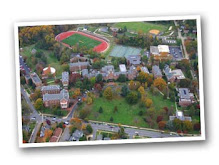
On Saturday I ran into a Casady mom at Krispy Kreme. She introduced herself and told me she had a 9th grade daughter. She shared with me that she had attended the Dessert with the Dean event on Wednesday with Maria Laskaris, Dean of Admission at Dartmouth College. What she took from that night was the importance of helping her daughter move from the "what" to the "why". Before her daughter decided to join a club or volunteer her time, she needed to explore why she wanted to do it. The mom then referenced Dr. Powell, and how on UD Parent Night, Dr. Powell explained to a room full of parents that in high school,the question that students learn to answer in their essays and writing is the "Why" question.
Too often, I think, we don't ask why, especially when it comes to our college search and final selection. We rely instead on US News and World Report and their ranking system to answer that question for us. It's a symptom, really, of a much larger, systemic problem. Too much of our curriculum is done to kids. As I've witnessed first hand, this pedagogical approach to education doesn't produce "autonomy, mastery, or purpose," to borrow from Daniel Pink's new book Drive. Instead this approach produces in our kids an unhealthy co-dependence, shoddy apprenticeship, and an anemic purposelessness.
I tell my 9th grade English students on the first day of class, for example, that I'm not going to answer the "why" questions for them. This is their education. Not mine. And though I will certainly help them in their exploration, I won't climb that mountain or dive into that oceanic depth for them.
This brings me then to what I most appreciated about my two full days interacting with Maria Laskaris. Beyond being an Ivy Dean, Maria is a mother, in fact, one of only three moms among the Ivy League Deans. Therefore Maria knows what the college admission process is like on the other end. She's been in the "other's shoes". She knows the anxiety that comes with not knowing whether or not the college will accept her daughter. She's suffered sleepless nights. She's calculated the odds. She's rehearsed the rejection speech to comfort her daughter. And she's had to deal with the vagaries of competitive college admissions. But what Maria discovered through the process that alleviated personal anxiety and made the process more enjoyable was realizing that her daughter's college thumb print was not the same as her own.

And even though Maria wanted her daughter's thumb print to match the one at Brown, in the end, she knew that her daughter's anatomical match was at Wesleyan. Now with her second child going through the college process, Maria has been able to relax and enjoy the match making process all the more, where her daughter's artistic thumb print will probably best match a school like Oberlin.
It's ironic to me, in closing, that a Dean of Admission at an Ivy School can understand more clearly than most parents that a college is not a match to be arranged, but a match to be made.
So let's not be afraid to ask why. And let's not be afraid to discover the answer that lies beneath and let that be the navigating instrument that leads us to our True North.












